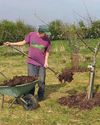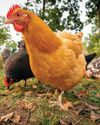
With spring in the air and eggs on our mind, now's a great time to think about expanding your flock or starting out with a few second-hand hens. Diligent layers, friendly, precocious, and endearing are just a few of the common descriptors used to describe ex-commercial hens. The most common phrase? Life enriching.
Let's get started with the basics, from how many hens to adopt to introducing them to resident pets...
How many hens can I adopt?
Hens are sociable creatures and like to be part of a flock, so the minimum number of hens you can reserve is three. If you already have hens then you can adopt just two, while the most you can adopt is 20 which must all stay together with you.
Can I adopt hens if I already have other chickens?
Yes! We always advise you adopt a greater number of hens than you currently keep, so if you already have, say, three hens, make sure you adopt at least four new ones. This gives the incoming hens advantage in numbers over those who are already familiar with your routine and will help them settle better.
When can I get my hens?
Our rehoming days are timed around when farms are 'depopulating' (in other words, making way for new hens by sending their current flock to slaughter). Our volunteer teams around the country usually hold rehomings every four to six weeks and you can check our upcoming collection dates on our website. You'll need to apply to rehome and book your hens first, so do give us a call; this essentially allows us to ensure we are giving you the best advice we possibly can.
What will a hen cost?
This story is from the April 2024 edition of The Country Smallholder.
Start your 7-day Magzter GOLD free trial to access thousands of curated premium stories, and 9,000+ magazines and newspapers.
Already a subscriber ? Sign In
This story is from the April 2024 edition of The Country Smallholder.
Start your 7-day Magzter GOLD free trial to access thousands of curated premium stories, and 9,000+ magazines and newspapers.
Already a subscriber? Sign In

How to Buy a Smallholding in France- Long-time smallholder Lorraine Turnbull looks at the practicalities of moving to rural France
Aspiring smallholders are continually thwarted by the prices of smallholdings and property with land located within the UK. Even the humblest croft in Scotland comes with a substantial price tag and conditions which would make even an adventurous wannabee consider carefully. But all is not lost. For those willing to take the adventure of a lifetime, there is always Europe, and one of the most popular places is France.

Meet the Bournemouth goats and their supporters
These capricious animals are hard workers preserving the natural habitat

Still warm enough to sit outside with a Pizza
Henrietta Balcon uses fresh figs to create an unusual dish at Harvest time

Goodbye to the birds of spring and summer
If you look and listen you might be able to see them preparing to leave says The RSPB

Get ready for the colder weather in the warmth of late summer
Claire Waring advises on doing the best to make sure your colonies survive until next spring

Preparing the Veg Patch for Winter
Lee Senior says, a well-run plot can excitingly continue to produce good quality, tasty, fresh food for much of winter

Time to prepare to plant your orchard
Wade Muggleton, smallholder and author of The Orchard Book, shares his practical experience so you can create your own fruit collection

Choosing feed for the autumn
As autumn approaches, Joanna Palmer, nutritionist at the Smallholder Range, offers advice on choosing the right feed to support your adult birds through their annual moult and ensure your young birds grow and finish well at this time of the year.

Vet advice from an experienced poultry vet
Reflecting on how much the humble hen has helped people world wide plus advice on stopping the scourge of red mite

Give your hens some support
Paul Donovan looks at the right and wrong ways of handling birds